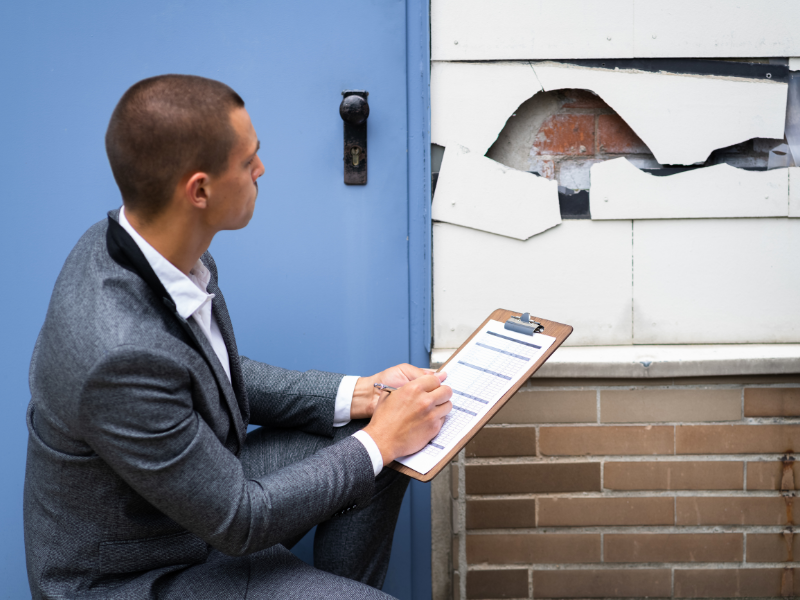Properties, like people, age. Whether they age well is up to you and your tenant.
A little wear and tear is normal for any occupied unit. A cracked tile, some peeling paint – these are all to be expected when someone lives in a home. But when does reasonable wear and tear cross the line into unreasonable damage?
That’s a question that’s been hotly debated at the Landlord and Tenant Tribunal of Ontario (LTB) as landlords and tenants rarely agree on where to draw the line, and who takes responsibility. Normal wear is the responsibility of the landlord, but it’s up to the tenant to make good on any damage they’ve caused. If they don’t, landlords can start eviction proceedings.
What is ‘normal’ wear and tear, and what is damage?
Neither wear and tear or damage are well defined by the Residential Tenancies Act, but the LTB helpfully adds some clarity – using the example of a scuffed carpet to illustrate normal wear and tear.
Essentially, wear and tear covers anything that happens with reasonable use of a premises. If you’re walking on a carpet, day after day, month after month, it’s going to scuff. If you open a window a few times a week for a year, paint might well start flaking off the sill.
Conversely, anything outside normal use can be considered damage. For example, if you throw a heavy object at the window and it breaks, that’s not exactly normal use of the window. Likewise, dropping a lighter on the carpet and burning a hole through it is, again, not normal use.
While you obviously can’t plan ahead for damage, you can – and should – mitigate the effects of normal wear and tear with regular maintenance. Landlords are expected to keep their units in a reasonable condition for their tenants, so they should be scheduling regular repairs and checks.
What are the options for landlords if tenants damage the unit?
If the worst happens and the unit gets damaged, landlords have to decide what steps to take next. According to the RTA, tenants are liable for “undue” damage, caused by “wilful or negligent conduct”. And it doesn’t matter if it was someone else – it’s still the tenant’s responsibility if the damage was caused by their guest, or another occupant of the property.
This provision also covers not just damage in the unit, but damage in common areas such as the hallway, elevator, stairway, or parking area.
Once landlords have established damage caused by the tenant or their guest, they should get in touch with the tenant to try to resolve the situation amicably. Ask the tenant to repair the damage by a set deadline, giving them a chance to correct it before taking a more official approach.
If the tenant refuses to repair the damage or fails to do so by the deadline, landlords can then apply for remedies by issuing either an N5: Notice to End your Tenancy For Interfering with Others, Damage or Overcrowding or an N7: Notice to End your Tenancy for Causing Serious Problems in the Rental Unit or Residential Complex.
The main difference between an N5 and an N7 is intent. If landlords are certain that damage was caused ‘wilfully’, they should use an N7. If it was an accident or negligence, an N5 is more appropriate. This is because an N5 gives the tenant the opportunity to pay for the damage and make it right. An N7, on the other hand, is a preliminary to eviction.
Under an N5, tenants get a second chance – they have seven days to repair the damage (or pay for it). If they don’t pay or repair it within those seven days, the landlord can then file an application to evict with the LTB.
Tenant vetting and management
No landlord enjoys conflict. Dealing with damage can be a lengthy, costly, and very stressful process so it’s always better to minimize the risk by acting proactively.
Properly vetting tenants gives you a better chance of screening out troublemakers who are likely to be careless with your unit. It’s worth taking the time to find a good tenant, who respects your property and with whom you can develop a trusting relationship over the long-term.
Our experienced property management team at Highgate takes the stress out of being a landlord by handling every aspect of renting – from tenant vetting and management to property maintenance and emergency repairs.
We carefully screen every tenant, conducting interviews and running comprehensive background checks, to make sure you have someone you can trust in your property. Once they’ve met our high standards, we’ll manage the rental on your behalf, collecting rent, dealing with repairs, and negotiating any disputes.
Discover how you can make the most of your investment, contact us today to find out more about our professional property management services!





